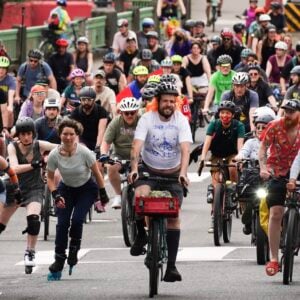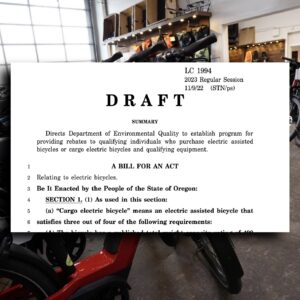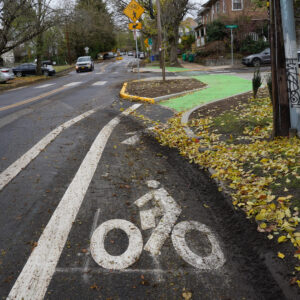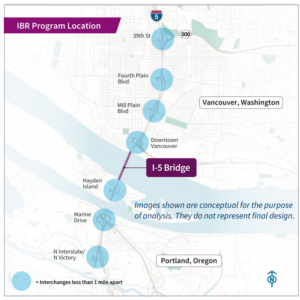Mark Ginsberg, lawyer in the Ayla Holland case, has just sent me the official transcript (PDF, 2.1MB) from her traffic court trial. It’s an interesting read.
If you don’t get around to downloading the file, here’s the excerpt from the judge’s final decision:
Judge Lowe:
“The testimony here is that there was no brake. By that, I mean…there was no specific device specifically designed to slow the vehicle down. All right? Your argument, Mr. Ginsberg, si that the gearing could be used to slow the bike down. And the defendant said her feet could be used to slow the bike down.
The problem that I see it is this, that — and where I think the defense has missed the point, the point is that the — the source of the braking force is not the gear on her bike, it is her. It is the application of her muscles to those pedals in reverse to try and slow a bike down. I have seen bike messengers driving at fairly high speeds. I think we all have. Now, the question is, can that be done safely? I don’t think so. I don’t think you can safely stop at an —
I think the statute is clear, it’s a brake — it has to have a brake. It’s sort of like a rose is a rose is a rose. All right? I think there has to be a brake mechanism. And I don’t find that the gearing is — fits within that definition. There has to be a separate force of some sort, separate device designed to stop the bike, separate and apart from the musculature of the operator.”
Lawyer Mark Ginsberg interjects:
“Why separate, Your Honor?”
The Judge:
“Because otherwise, we would be saying that a person who is like me, who isn’t very strong in the legs, all right, would be on the sme level as the defendant who may be very strong in the legs, and the braking difference would be great. I think the statute is clear. I think that — I understand what you’re trying to do, but I don’t think you’ve met it.
The term brake, it must be equipped with a brake. You know, quite frankly, had she had a stick on the back end rubbing against the tire, you might have an argument. But here, there is no brake. It’s just that simple. There’s no brake. There is a mechanism which she may use as a brake in certain situations, the gearing, her musculature, things like that.
….
So in all honesty, I don’t believe that the defense has convinced me that I should broaden the pretty obvious term brake to include simply a gearing mechanism that has no innate ability to stop other than the fact that it’s gearing. I am going to enter a finding of guilty.”
Still no official word on whether or not they will appeal the the ruling.
Full transcript here (PDF, 2.1MB)








Thanks for reading.
BikePortland has served this community with independent community journalism since 2005. We rely on subscriptions from readers like you to survive. Your financial support is vital in keeping this valuable resource alive and well.
Please subscribe today to strengthen and expand our work.
Judge Lowe has narrowed the definition of the word “Brake” to something less than provided by unabridged.merriam-webster.com (thanks M Ginsberg for court’s definitive authority on meaning of words):
Main Entry: 5 brake
(2) : something designed or used to slow down or stop movement, momentum, or activity
How are people supposed to be upright citizens when being cited for following the common meaning of words that make our laws?
John Boyd
Indeed John, the judge is completely confused. The property he is search for is mechanical advantage. He thinks a fixed gear lacks mechanical advantage therefore it must not be a brake.
Well, the legislature *did* address mechanical advantage. Implicitly so, by defining an objective required efficacy: skid rubber on dry pavement.
The judge is completely out on a limb ignoring the legislature’s stated requirement and substiting his own opinion concerning the proper amount of mechanical advantage. This is reinforced by his little “rubbing stick” comment.
Incidentally, to show how out of his realm the judge is, while a wooden stick can easily be made to have tremendous mechanical advantage, the friction between a stick and the tire would be so low that any skidding would be nearly impossible. So the overall efficacy of a wooden stick, while having plenty of mechanical advantage that the judge so loves, is actually less than the legislature demands and is obviously unsafe.
The legislature got it right after all, there is nothing wrong with the ORS. The problem is with the judge thinking he can substitute his own opinion.
One last thing again to show how removed from the statute the judge is, he says allowing a fixed gear to be legally considered a brake (physically it is a break whether the judge can understand it or not) would allow weak riders to “be at the same level” as the defendent is patently wrong.
The legislature requires an objective efficacy. They explicitly state the brake must be capable of skidding rubber on dry pavement. If the rider cannot accomplish that, a ticket is due and justified. Weak riders cannot use this case as cover to ride fixed gear. If you’re not strong enough to skid, don’t ride the steed.
West: So what you’re saying is that Judge Lowe is an ACTIVIST JUDGE??
(just kidding, just kidding)
I’m going to remove the mechanical brakes from my van and start opening the door and dragging my foot on the ground. I am positive I could argue this in court to be resonable means to slow down my vehicle. I have extremely strong legs and shoes with sticky soles.
quote “Main Entry: 5 brake
(2) : something designed or used to slow down or stop movement, momentum, or activity.
AHAHAHAHAHAHAHA!!! A STICK….HE HONESTLY SAID A STICK. JUDGE, MY CLIENT DID HAVE A 2×4 IT’S MADE OF MAHOGANY AND QUITE NICE. SHIT, IF I HAD A STICK WITH ME AT ALL TIMES…THERE WOULD BE SOME DENTS IN SOME CARS THAT ARE: ON THEIR CELL PHONES, RIDE IN THE BIKE LANES, YELL SHIT AT US AS WE RIDE, AND SO ON. IT’S QUITE A LOVELY STICK, IT’S NAME IS CHUCK.
Jake, please go downtown and get coffee at Stumptown. Take some time and watch people a come and go on their brakeless fixed gears and observe that they can indeed stop a 20 bike using just their legs resisting the forward motion of the pedals.
I don’t you can stop a 3500 lb. van with your feet. It’s just not the same.
Efficacy, Jake. Efficacy.
It occurs to me I should provide a link:
http://www.dict.org/bin/Dict?Form=Dict2&Database=*&Query=efficacy
SKIDmark,
Yes I know I can stop a fixed gear without the use of a mechanical brake. I am not arguing that. By the above definition and the judges own words I feel that all I legally need are my shoes.
Of course I’m just kidding.
I’m waiting for the cops to ticket the kids on their tricycles and Big Wheels since they are also fixed gear and brakeless.
Have a look at this “Death Mobile”! It boldly defies the law as it storms out-of-control down the public roadways!
http://www.radioflyer.com/trikes/images/34_hero.jpg
Quick, call Judge Lowe!
Just to finally put the notion to rest…Statute 814.484 of the ORS explicitly states that childrens tricycles are exempt from the law.
The judge’s comments seem reasonable to me. I think the judge is concerned about novice riders on fixed-gear bikes who are very capable of blasting down a hill at 30mph but are not capable of stopping the bike, thus putting pedestrians and other cyclists at risk. You can perhaps ask for a demonstration of a cyclist’s braking prowess but that would require a standard test and wouldn’t help after a collision anyway.
A front brake doesn’t cost much and doesn’t ruin the look of a fixed-gear bike. If you don’t need it, don’t use it. But if you DO need it, then it’s there. So the judge’s position seems pretty common sense to me, if not well articulated.
Andrew,
I totally agree.
As far as the front brake damaging the looks of your bike, just put a couple more cards in your spokes and an extra anti-Bush slogan on your bike and you’ll be good to go.
Sorry Jake. It’s hard to tell when someone is joking or just ignorant about how a fixed gear works.
What I don’t understand about the Judge is that he fails to address or acknowledge the fact that Ayla can and did stop her bike safely when asked to do so. The fact that she was able to do this (to me) means that the Police Officer had no reason to talk to her at all.
I would recommend that Mr. Ginsburg stop arguing that the cyclists’ legs that are the “brake”, and start arguing that the rear hub *is* the brake. Sure you have to use muscles to engage the brake mechanism, but that is true of hand brakes as well. What really stops the wheel from turning (and enables the skid) is the hub. I don’t think the “separate” argument is a winner.
This also lends itself to a easily understood visual exhibit that you can hold in your hand. “Your honor, my client’s bike is in fact equipped with a brake that meets the definition of the statute. Here it is.”
I would also draw a comparison to back pedal brake hubs, which are visually indistinguishable from fixed hubs. Using the judge’s logic, you have to use your leg muscles to activate a back pedal brake, so these would be illegal, too? That’s going to make a lot of 3 to 10 year old children very unhappy.
Andrew, Tim, others not clear on the rule of law,
Judge Lowe’s comments regarding safety seem completely reasonable and make common sense to me too. He should get himself elected to city council and propose more and better statutes that benefit us all.
But for now he is a Judge. Like referees and umpires, his job is to make sure the rules of court procedure are followed by both sides.
One of which rules is the judge must decide without regard to whether the agrees with the law.
http://www.abanet.org/publiced/courts/judge_role.html
So even if people are frickin dying in streets, Judge Lowe swore to uphold the law, not selectively redefine it according to his personal cycling comfort level/risk analysis.
John Boyd
Andrew, Tim – it doesn’t matter if the court’s opinion is REASONABLE, it matters if it’s legal. Look at the judges remarks:
“Now, the question is, can that be done safely? I don’t think so. I don’t think you can safely stop…”
Guess what – it doesn’t matter one whit what the judge THINKS. Ayla Holland could have proved for the court right then and there that she could pass the skid test, and rather than accept unimpeachable, physical evidence, the court rendered a verdict based on what the judge THOUGHT. It doesn’t matter what you THINK, it matters what you can PROVE in court. The state failed to prove that the defendent couldn’t meet the conditions of the statute and the court failed to deliver a verdict based on evidence rather than the judge’s opinion.
If Judge Lowe bases all his verdicts on opinion, then it is my OPINION that Judge Lowe should be removed from the bench.
benschon – I agree. All brakes are activated by human muscle power, even those in a car. Hydraulics merely amplify human force. Should we say that cars don’t meet the statute because physically challenged people can’t depress the brake pedal hard enough to stop? We don’t cite the equipment in that case, we cite the driver. So should it be with bikes. If they can apply enough force to skid, then they meet the conditions of the statute, unless the state legislature wants to define “brake” for us.
One could argue that a fixed-gear is superior to coaster brakes, because there are fewer parts to fail – inherently a more reliable design.
They argument here isn’t whether a fixed-gear is safer, it’s about whether or not it’s legal. I argue that it is.
The fixed gear was a suitable form of braking before the coaster brake and the rim brake were invented. This was in a time when tires were solid rubber and roads were dirt.
Jonathan said:
Just to finally put the notion to rest…Statute 814.484 of the ORS explicitly states that childrens tricycles are exempt from the law.
The answer is so simple–all the messengers just need to ride tricycles instead! 🙂
Think of the job opportunities for Zoo bombers!
After reading the article I had the same thought as Matt P all brakes use human muscle to activate.
Ya know I don’t know what the terrain is like where this case is, but it seems to me the argument is whether the law is right or wrong, not whether the person broke it. The argument of the Van Vs Bike isn’t unfair. I can drive my Van, and then throw the gear into reverse to stop. The reverse gear wasn’t designed to stop the Van. Likewise on current models of bikes the drive train wasn’t designed to stop the bike, it was designed to set the bike in motion. And yes I’ve been on a track bike, on the street, in a Velodrome etc… Stopping a track bike on the street is, at best, similiar to trying to stop with just a coaster brake, which if you way 40lbs and are riding on your driveway is fine. On the flats it’s OK, but in a hilly city, or a wet city, you are toast. I’ve seen guys lock the rear wheel of a track bike and and the bike slide half a block before they can stop. I actuate a single front brake and I stop 10x faster. Pro Track racers don’t ride brakeless on the street, and it pointless to do so for amateurs.